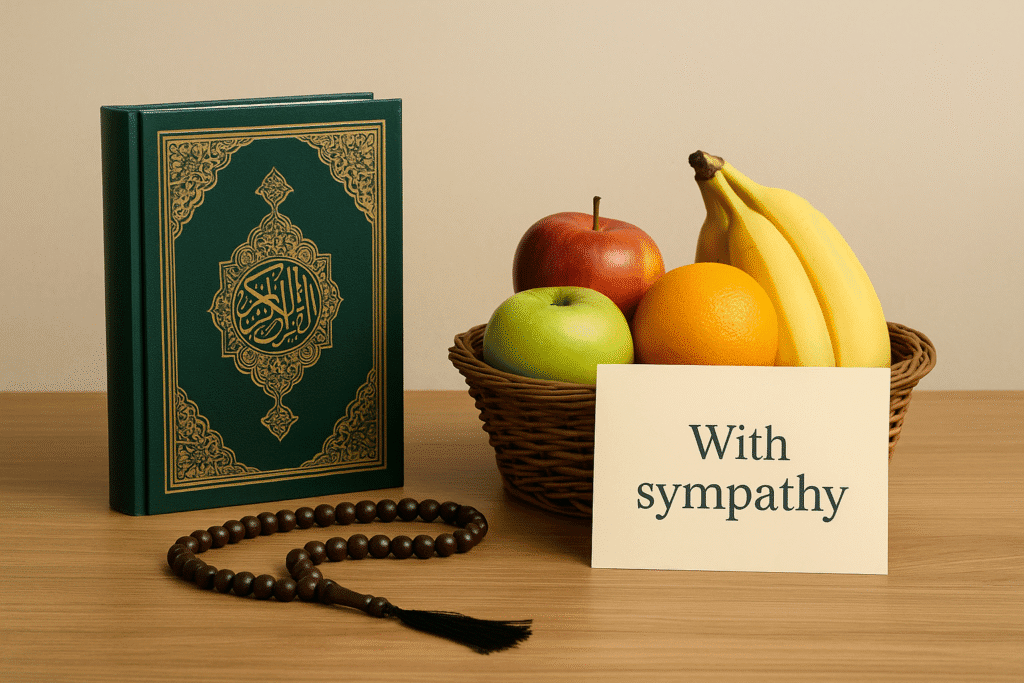What to Send a Muslim Family When Someone Dies: A Thoughtful Guide
When someone passes away, it’s only natural to want to offer comfort and support to the family. If the bereaved are Muslim, it’s important to understand what is culturally and religiously appropriate. Knowing what to send a Muslim family when someone dies helps ensure your gesture brings real comfort and shows respect for Islamic customs.

Understanding Muslim Funeral Traditions
In Islam, death is viewed as a return to Allah and the beginning of the soul’s journey to the hereafter. Funerals happen quickly—often within 24 hours—and the focus is on prayer, reflection, and supporting the grieving family.
Gifts are not about extravagance but about practical help and spiritual benefit.
Meaningful Condolence Gifts for Muslim Families
Here are some respectful and well-received ideas:
1. Halal Food or Home-Cooked Meals
Providing halal food is one of the most appreciated gestures. It allows the family to focus on mourning without worrying about meal preparation.
Consider fruit baskets, cooked dishes, or ordering from a certified halal restaurant. If you’re unsure, vegetarian options are a safe choice.
2. Sadaqah Jariyah in Memory of the Deceased
A Sadaqah Jariyah (ongoing charity) benefits the deceased and brings comfort to their family. Examples include:
- Donating to build a water well
- Sponsoring education for a child
- Printing and distributing Qur’ans
3. Islamic Books or Prayer Items
You can gift a beautifully bound Qur’an, a prayer rug, or Tasbih (prayer beads). Present them respectfully and, if possible, include a note explaining that the gift is in memory of their loved one.
4. A Personal Condolence Card with Islamic Phrases
A heartfelt handwritten note can mean a great deal. You might include:
- “Inna lillahi wa inna ilayhi raji’un” (Indeed we belong to Allah and to Him we return)
- A short dua (prayer) for the deceased
5. Offering Your Time and Help
Sometimes, the most valuable gift is your time. Offer to help with errands, transport relatives, or assist with meal preparation. Acts of service are deeply valued in times of grief.
What to Avoid Sending
Certain gifts are best avoided:
- Flowers (many families see them as unnecessary)
- Non-halal food or drink
- Religious symbols from other faiths
Keep your gesture simple and sincere.
Cultural Notes
Muslim communities vary:
- In South Asian cultures, food and charity are common.
- In Middle Eastern families, Qur’an recitations may be arranged.
- In Western Muslim communities, modest sympathy baskets are more common.
Frequently Asked Questions
Can I send money to the family?
Yes, but giving to charity in the deceased’s name is more meaningful.
Are flowers acceptable?
They’re not forbidden, but practical or spiritual gifts are preferred.
What should I bring if I visit the family?
Bring yourself, your prayers, and something that eases their burden—like food or a donation.
Can non-Muslims participate in Sadaqah Jariyah?
Yes, anyone can contribute to charity on behalf of the deceased.
When should I send my gift?
As soon as possible after the death, but acts of charity and support are welcome at any time.
Final Thoughts
Choosing what to send a Muslim family when someone dies comes down to thoughtfulness and respect for their faith. Whether it’s a halal meal, a Sadaqah Jariyah donation, or simply being there to help, your gesture will be remembered and appreciated.
Recommended resource:
What to Wear as a Guest to a Muslim Wedding: Modest & Stylish
Learn more about Islamic funeral customs in this detailed guide to Muslim funeral etiquette.
